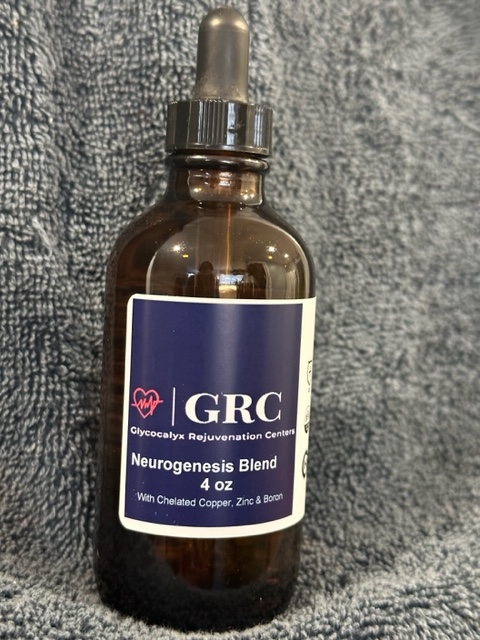Description
GRC Neurogenesis Blend
(Brain rejuvenation) Peptides & Minerals Suspended in Nano Particles
BPC-157 Peptide
• BPC-157, a synthetic peptide recognized for its regenerative characteristics, holds substantial importance in enhancing brain health and cognitive functions by means of its neuropeptide therapy effects.
• Improving brain health through BPC-157 entails leveraging its neuroprotective properties to bolster synaptic function and stimulate neurogenesis. These neuroprotective attributes are instrumental in safeguarding neurons against damage induced by oxidative stress and inflammation, thereby preserving optimal brain functionality.
• By reinforcing synaptic function, BPC-157 facilitates neuronal communication, a pivotal component for cognitive functions such as learning and memory. Additionally, its capacity to promote neurogenesis, the generation of new neurons, shows promise in advancing brain repair and regeneration across a spectrum of neurological conditions.
• The multifaceted influence of BPC-157 on brain health underscores its potential as a valuable therapeutic adjunct for addressing neurodegenerative ailments and cognitive deterioration.
Boron
• Research has indicated that boron may play a role in brain function.
• A 1994 study published in the journal Environmental Health Perspectives Trusted Source found that people who added 3.25 mg of boron to their diets were better at memory and hand-eye coordination tasks than people with low boron levels.
• Boron can aid in keeping your bones strong along with improving brain function.
Copper
• Increased Memory and Learning
• Copper deficiency could make it harder to learn and remember. That’s because copper plays an important role in brain function and development.
• Copper is used by enzymes that help supply energy to the brain, aid the brain’s defense system and relay signals to the body Interestingly, a study found that people with Alzheimer’s had up to 70% less copper in their brain, compared to people without the disease
Zinc
• Zinc defense in combating brain diseases
• Zinc is one of the most abundant metal ions in the central nervous system (CNS), where it plays a crucial role in both physiological and pathological brain functions.
• Zinc promotes antioxidant effects, neurogenesis, and immune system responses. From neonatal brain development to the preservation and control of adult brain function, zinc is a vital homeostatic component of the CNS.
• Molecularly, zinc regulates gene expression with transcription factors and activates dozens of enzymes involved in neuronal metabolism.
• During brain development in children and in adulthood, zinc acts as a regulator of synaptic activity and neuronal plasticity at the cellular level.
• There are several neurological diseases that may be affected by changes in zinc status including stroke, neurodegenerative diseases, traumatic brain injuries and depression.
• Accordingly, zinc deficiency may result in declines in cognition and learning and an increase in oxidative stress.






Reviews
There are no reviews yet.